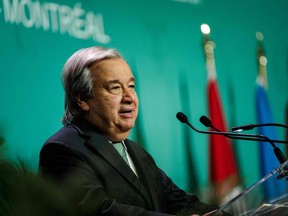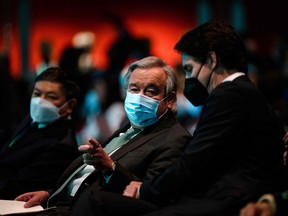Destruction of biodiversity comes at a high price, UN Secretary-General António Guterres says: “Lost jobs, economic devastation, rising hunger, higher costs for food, water and energy, diseases, and a degraded planet.”

Humanity “has become a weapon of mass extinction,” with a million species at risk of disappearing forever, United Nations Secretary-General António Guterres said in Montreal on Wednesday.
He urged the 193 countries gathered in the city for the UN’s COP15 biodiversity conference to come together and save the planet’s animals, plants and ecosystems for future generations.
Sign up to receive daily headline news from the Montreal Gazette, a division of Postmedia Network Inc.
Thanks for signing up!
A welcome email is on its way. If you don't see it, please check your junk folder.
The next issue of Montreal Gazette Headline News will soon be in your inbox.
“We are waging a war on nature,” he told a press conference on the first official day of COP15.
“Ecosystems have become playthings of profit.
“Human activities are laying waste to once-thriving forests, jungles, farmland, oceans, rivers, seas and lakes.
”Our land, water and air are poisoned by chemicals and pesticides, and choked with plastics.”
He said the world’s “addiction to fossil fuels has thrown our climate into chaos” and “unsustainable production and monstrous consumption habits are degrading our world.”
The destruction comes at a high price, he added: “Lost jobs, economic devastation, rising hunger, higher costs for food, water and energy, diseases, and a degraded planet.”
He said the solution could be within the world’s grasp.
“We need governments to develop ambitious national action plans that protect and preserve our natural gifts, and put our planet on a path to healing.
“We need businesses and investors to put protection first in their business plans, and invest in sustainable production and extraction methods across every link of their supply chains.”
He said developed countries must provide “meaningful financial support” for developing nations, which are “custodians of the world’s natural wealth following centuries of exploitation and loss.”
“We (also) need to work side-by-side with the most effective guardians of biodiversity — Indigenous Peoples, local communities and young people.”
He said “the sad truth is that we’ve made a mess of our world (and) we cannot pass the buck to our children to clean it up.”
“It is only by investing in Planet Earth that we can safeguard our future,” he added.
“It’s time for the world to adopt an ambitious biodiversity framework — a true peace pact with nature — to deliver a green, healthy future for all.”

At COP15, about 20,000 delegates from around the world are gathering for two weeks to negotiate an eight-year plan to preserve and restore biodiversity. Delegates are working on a “global biodiversity framework.”
Experts say biodiversity — essentially nature, from insects, plants and animals to the forests, streams and oceans they live in — is under threat because of deforestation, overfishing, invasive species, industrial farming, pollution and climate change.
Among the targets envisioned: preserving 30 per cent of the world’s land and water by 2030, and accepting the fair and equitable sharing of benefits of genetic resources — in medicine, for example. Developed countries typically benefit more than the developing countries where these resources often originate.
Earlier Wednesday, Prime Minister Justin Trudeau announced the federal government will spend up to $800 million to support four major Indigenous-led conservation projects across Canada.
Covering almost one million square kilometres, they are in British Columbia, Ontario, Northwest Territories and Nunavut.
-

Saving nature is the goal at COP15 in Montreal. Will Quebec step up?
-

'Make peace with nature': World gathers at Montreal's COP15 to protect biodiversity
-

COP15 FAQ: Why 20,000 delegates are coming to Montreal to talk nature
-

Mount Royal: Montreal’s wildlife oasis is under threat
-

COP15: Innu 'exasperated' by Quebec’s failure to protect caribou on North Shore
-

COP15 in Montreal: Brace for protests, civil disobedience and student strikes
ariga@postmedia.com


